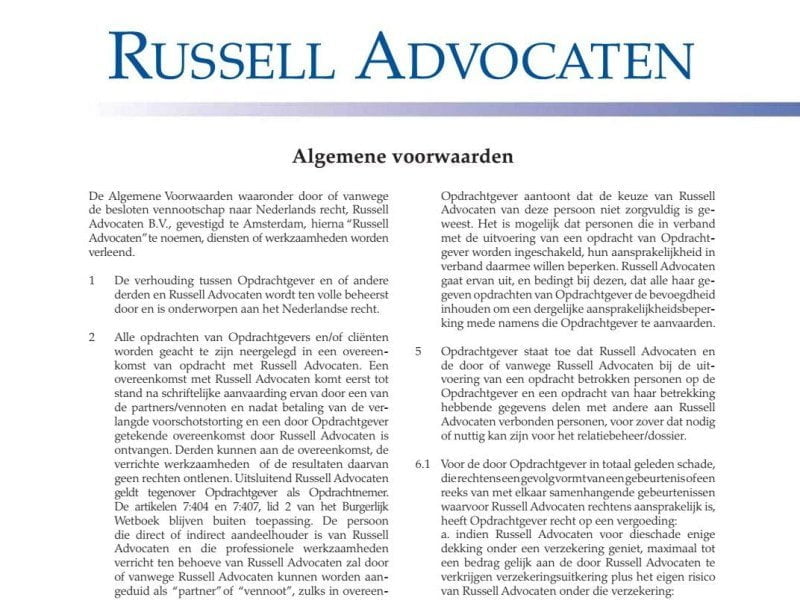Reinier advises national and international companies
reinier.russell@russell.nl +31 20 301 55 55Liability for damage can lead to high compensation payments. Is it possible to exclude liability completely, or can it merely be limited? And what measures do you have to take to do so?

This is one of the most common questions we are asked by entrepreneurs. The question is obvious, as liability for damage can lead to high compensation payments. So is it possible to exclude liability completely, or can it merely be limited? And what measures do you have to take to do so?
In contracts you can lay down what you will or won’t be liable for. As it is inefficient to negotiate each contract separately, General Terms and Conditions are an efficient solution for standard limitations.
A clause included in the General Terms and Conditions which limits or excludes liability is called an exoneration clause. An exoneration clause must be drawn up correctly and its content has to be accurate as well. Otherwise, there is a high risk that the clause will not be (fully) valid and thus liability would not be excluded after all.
The requirements for an exoneration clause are (partly) stipulated by law:
In order to assess the validity of an exoneration clause, the Court will not just consider the statutory requirements but also the circumstances of a specific situation. For instance,
An exoneration clause can limit your liability extensively, provided that certain requirements are met. A clause that limits liability to too great an extent can be declared void. By this you will also be held liable for matters you could have excluded.
If you intend to exclude liability, you will have to take the following steps:
In the event an exoneration clause is invoked, check whether all (legal) requirements have been met and if the exoneration clause may be declared void.
Would you like to know more about the exclusion of liability, drafting contracts and/or General Terms and Conditions? Please contact:
Reinier W.L. Russell, LL.M. (reinier.russell@russell.nl).
The franchise agreement and the distribution agreement are very similar, but there are also important differences. What are the consequences if you conclude a franchise agreement when it is actually a distribution agreement or vice versa? How can you avoid this misunderstanding?
The government has outlined in a letter how it intends to translate the proposals from the Buma Committee’s advice into regulations. What does this mean in practice for private individuals who own art or other cultural goods? But first: what are the rules for exporting protected cultural goods at the moment?
The government has outlined in a letter how it intends to translate the proposals from the Buma Committee’s advice into regulations. What does this mean in practice for private owners of art or other cultural goods? Will this solve the problems of owners?
An important part of corporate governance is compliance with the various rules governing the company. How do you ensure that your company becomes and stays compliant?
The shareholders’ agreement is the most important agreement entered into between shareholders and the company. What matters should you cover in this agreement?
The use of general terms and conditions is something companies can no longer do without. Contracting parties refer to their own general terms and conditions in small print, often containing favorable clauses for their own benefit. But what is the power of general terms and conditions? And what should be considered when using them?